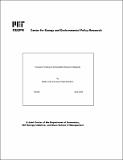| dc.contributor.author | Liski, Matti | en_US |
| dc.contributor.author | Montero, Juan-Pablo | en_US |
| dc.contributor.other | Massachusetts Institute of Technology. Center for Energy and Environmental Policy Research. | en_US |
| dc.date.accessioned | 2009-05-13T20:35:24Z | |
| dc.date.available | 2009-05-13T20:35:24Z | |
| dc.date.issued | 2008 | en_US |
| dc.identifier | 2008-006 | en_US |
| dc.identifier.uri | http://hdl.handle.net/1721.1/45520 | |
| dc.description.abstract | We analyze oligopolistic exhaustible-resource depletion when firms can trade forward contracts on deliveries, a market structure prevalent in many resource commodity markets. We find that this organization of trade has substantial implications for resource depletion. As firms' interactions become infinitely frequent, resource stocks become fully contracted and the symmetric oligopolistic equilibrium converges to the perfectly competitive Hotelling (1931) outcome. Asymmetries in stock holdings allow firms to partially escape the procompetitive effect of contracting: a large stock provides commitment to leave a fraction of the stock uncontracted. In contrast, a small stock provides commitment to sell early, during the most profitable part of the equilibrium. | en_US |
| dc.format.extent | 34 p | en_US |
| dc.publisher | MIT Center for Energy and Environmental Policy Research | en_US |
| dc.relation.ispartofseries | MIT-CEEPR (Series) ; 08-006WP. | en_US |
| dc.title | Forward trading in exhaustible-resource oligopoly | en_US |
| dc.type | Working Paper | en_US |
| dc.identifier.oclc | 244567577 | en_US |
